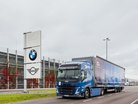BMW Drives Emission-Free Battery Transport With EV Trucks

In a strategic shift toward sustainable logistics, BMW Group Plant Leipzig has deployed two fully electric trucks for transporting parts used in high-voltage battery production.
This initiative represents a pivotal step in cutting carbon emissions within the manufacturing process of electric components and highlights BMW's commitment to greener transportation and production practices.
The electric trucks are projected to save around nine tonnes of CO₂ per year, supporting BMW's mission to reduce its carbon footprint throughout the supply chain.
Emission-free and efficient transport for EV components
These electric trucks run an eight-kilometre round trip between BMW's logistics centre and high-voltage battery production halls, completing up to 12 trips each day.
This totals nearly 100 kilometres per truck daily all without generating local emissions.
With their quiet operation, electric trucks help reduce noise pollution and emissions, benefiting urban and industrial settings significantly.
Petra Peterhänsel, Plant Director, BMW, highlights the efficiency of transporting parts between production facilities, stating: "Electric trucks are the perfect solution for shorter distances like this."
"We are delighted to undertake this journey with our longstanding logistics partner, the Rudolph Logistik Gruppe. The transition to electromobility and sustainable production affects not only our BMW and MINI cars but also our production methods and supply chains."
Key role in BMW's high-voltage battery production
Since 2021, BMW Group Plant Leipzig has been a leader in e-component production and, as of early 2024, now manages the full high-voltage battery production process.
This includes stages such as cell coating, module production and battery assembly.
The plant runs five cell coating lines, three module production lines and two battery assembly lines, employing around 1,000 staff focused on high-voltage battery production. These batteries power models such as the MINI Countryman Electric, BMW iX1, BMW i4, BMW i5 and BMW iX, meeting the strong demand for electric vehicles.
To support this shift, BMW repurposed former assembly halls, once used for the BMW i3 and BMW i8, into modern spaces for high-voltage battery production.
The transformation added approximately 150,000 square metres of production space to the plant. With an annual capacity of up to 300,000 batteries, BMW invested over 900 million euros in this development.
Improved performance and sustainability with Designwerk electric trucks
The two electric trucks built by Designwerk are equipped with lithium iron phosphate (LFP) battery systems, selected for their high efficiency and eco-friendly attributes.
These trucks are powered by four electric drives generating 610 horsepower, making them three times more energy-efficient than diesel trucks on similar routes.
They produce zero local emissions, such as soot, nitrogen oxides, or carbon dioxide, promoting cleaner air and a healthier environment.
Designwerk notes that these electric trucks are significantly quieter, generating around five decibels less noise than diesel trucks at low speeds.
The charging process is designed to coincide with drivers’ breaks, with the 340 kWh battery of each truck taking about 1.5 hours to reach 80% capacity. This efficiency allows the trucks to operate continuously, aligning with BMW’s nonstop production demands.
A comprehensive approach to sustainable logistics
The integration of electric trucks at BMW Group Plant Leipzig is a key element of BMW's Green Transport Logistics Project, aiming to cut emissions across the company’s global production and sales network. Beyond electric vehicles, the initiative includes trials of various sustainable technologies and fuels.
For example, at its Munich location, BMW has increased the use of biofuels like HVO100, made from residual and waste materials.
The company has also tested bio-LNG in other areas and is actively pursuing hydrogen as a fuel source through projects such as H2Haul and HyCET.
This multi-dimensional strategy supports BMW's ambitious goal of cutting CO₂ emissions by 40% throughout the entire vehicle lifecycle by 2030, compared to 2019 levels.
Eco-friendly automotive logistics
The adoption of electric trucks at BMW Group Plant Leipzig showcases the company’s dedication to sustainable logistics and production innovation.
By lowering emissions in component transport, BMW is setting a new benchmark in the automotive industry, underlining that sustainability is crucial to both the vehicles it manufactures and its production and logistics processes.
This transition marks a significant step in BMW's pursuit to meet the growing demand for eco-friendly transportation solutions while fostering a cleaner, quieter and more sustainable future in the automotive world.
Make sure you check out the latest edition of Manufacturing Digital and also sign up to our global conference series - Manufacturing & Mobility LIVE
Manufacturing Digital is a BizClik brand.
- Manufacturing & Mobility LIVE: The Future of EVs & MobilitySustainability & ESG
- Saab: Automotive Repurposing for Sustainable SuccessSustainability & ESG
- Stellantis & CATL Boost EV Manufacturing CapacitySustainability & ESG
- Formula E: Shaping the Innovative Future of EV ManufacturingSustainability & ESG


